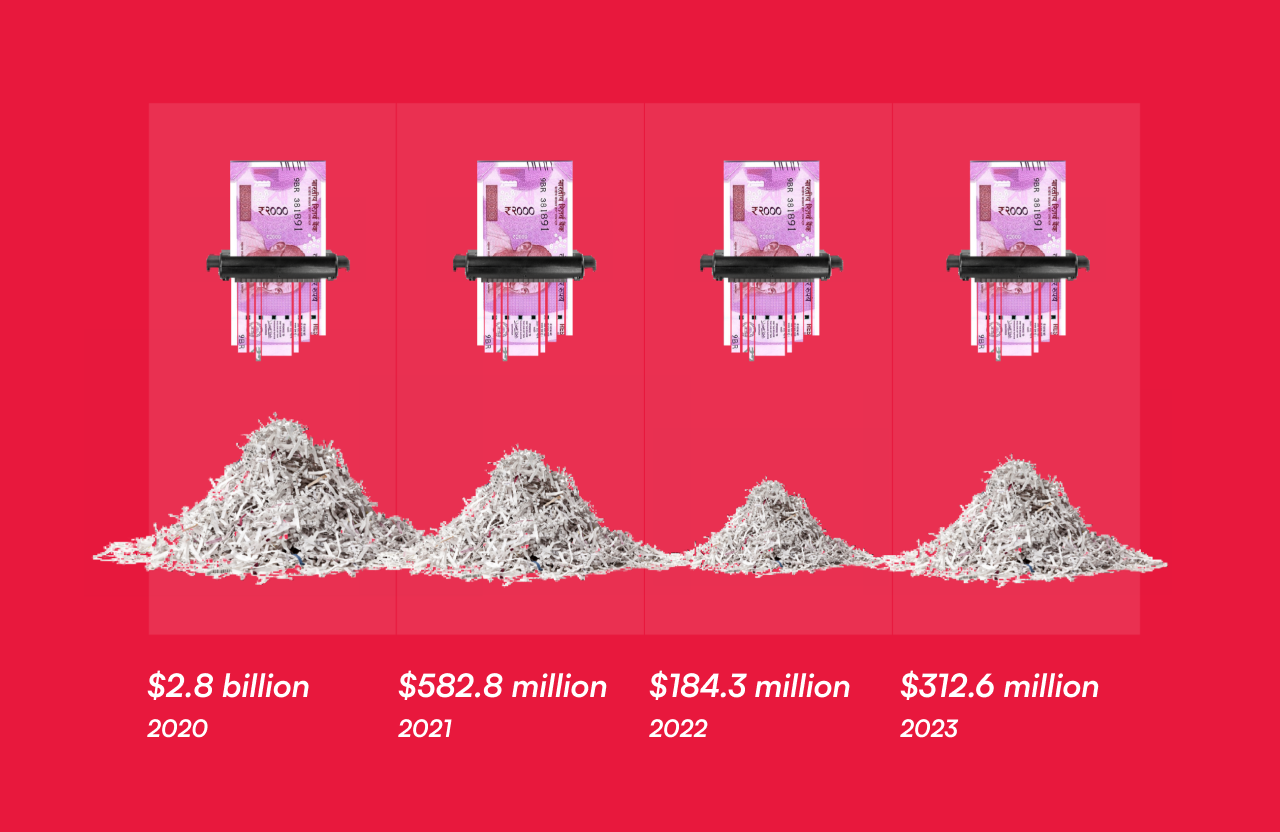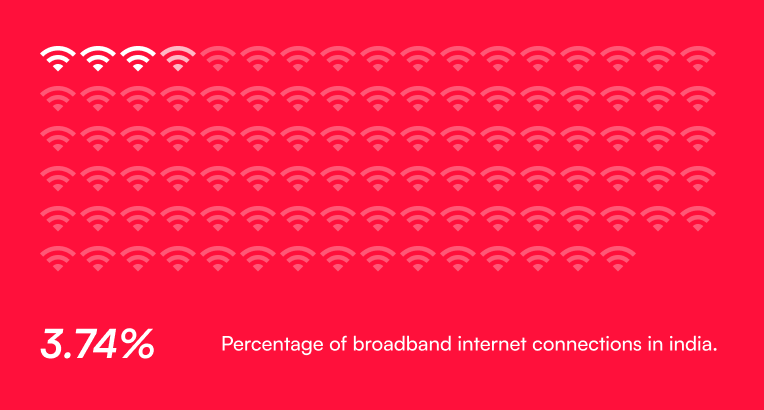
All data for the construction of these graphics is sourced from Top10VPN's annual Cost of Internet
Shutdowns
Reports
which calculates its estimates of the economic impact of internet shutdowns using the COST Tool developed by
internet
monitoring NGO Netblocks. Key indicators included in their calculations include data from the World Bank,
ITU,
Eurostat
and US Census. Beyond instances of internet blackouts, they also include instances of social media shutdowns
and severe
ISP throttling due to the equally disruptive impact they have on economic activity.
This data was recognised by the Parliamentary Standing on Communications and IT, which also noted further
that
“as per
Cellular Operators Association of India (COAI), telecom operators reportedly lose INR 24.5 million per hour
in
every
Circle Area where there is a shutdown
or throttling. Other businesses which rely on the internet could lose up to 50 per cent of the
afore-mentioned
amount.
It has been estimated that, in 2023, internet shutdowns have cost India $312.6 million so far. This number,
while
alarming on its own, may also fail to capture the complete cost of an internet shutdown. Media reports have
also social
and psychological costs of the shutdown, which are disproportionately borne by already-vulnerable and
marginalised
groups.
Relief Work
The internet shutdown makes relief-work more difficult amid ongoing violence in Manipur. Shutdowns also
impact the
efficacy of crisis interventions.
“I work with [victims of] domestic abuse and child victims of trafficking. Bad networks affect my work
because I can't
communicate [with the victims or my colleagues]. It affects the cases, especially it leads to loss of
information when
talking with the victims. The lapses in the information has [sic] sometimes led to the cases failing in
court. Sometimes
I could not reach the location for rescues in time because of the bad network. During some incidents when
people have
contacted me, I was not reachable. The incidents blew out of proportion because of lack of intervention by
me.”
- Quote from an earlier study
from
Manipur conducted in 2018
“Internet shutdown has made it more difficult to raise
money for relief work from outside Manipur. Because of the
shutdown, they have been raising money door-to-door, But because the state is in a limbo, people have
suffered
economically as well. They don't have money to donate.”
- Lainzalal
Vaiphei , Convener of a relief camp
Online Censorship
Internet shutdowns are an extreme form of online censorship that curtail the right to freedom of expression,
a
right which is particularly critical in situations of political unrest. It prevents the dissemination of
critical and potentially life-saving information. Shutdowns have also been used as a tool to evade
accountability. Without the internet, individuals and civil society organisations are often unable to
document
and share evidence of human rights violations. This is particularly concerning as a day after the state-wide
shutdown of mobile data services, the Manipur state government issued a “shoot-at-sight” order that was
condemned by Amnesty International
as
a “flagrant violation of human rights law and standards”. Internet
shutdowns make it difficult for journalists to do their jobs. Reportedly,
according
to a memorandum submitted
by the Editors Guild Manipur and the All Manipur Working Journalists’ Union to the state IPR minister, the
internet shutdown has made it impossible for them to update the software used to broadcast TV news.
“By and large it [internet shutdown] is being weaponized to subdue narratives that are not in the
authorities' political interests, and to shut down dissent or critical voices such as voices who ask
questions or seek accountability.”
- A human rights activist in Manipur told HRW and IFF
for their joint
report published in June 2023
“Media reports are often published days after the incident. The internet cut-off was one of the biggest
challenges as it has become an essential commodity for us reporters, reporters would file stories through
text messages or phone calls.”
- Rinku
Khumukcham, Editor of Imphal Times.
“This is a social media era. All the important updates are
made on social media, including by the government, which uses
it to post all its notifications. We are totally unaware during internet shutdown. We have no idea what
is going on.”
- A
Manipur-based journalist, who asked not to be identified, told HRW and IFF
Impact on Education
Shutdowns disrupt education for students both in and outside of the state. In Faheema
Shirin v. State of
Kerala, in September 2019, the Kerala High Court recognized the right to have access to the
internet
as a part
of the right to education as well as the right to privacy under Article 21 of the Constitution.
“I have taken a loan from my friend to pay my house rent.
We are
currently concerned about the ongoing university exams
because we are traumatised by what is happening around us and back at our hometown.”
- Seilenmang
Haokip, a 25-year-old final-year law student at Delhi University.
“My son is keen on pursuing his bachelor's degree
either from
Delhi or Bengaluru. And nowadays, all form filling
for
admission to these colleges is done through the internet. But due to net being cut off in the state we
have not been
able to access information on online
form submission, cut off marks last date for application in colleges in major
cities of India that are outside Manipur.”
- Grace
Paite(name changed), a resident of Lamka, a town in Churachandpur.
Access to Healthcare
Internet shutdowns disrupt the delivery of healthcare and other essential services, compounding the
difficulties experienced by people in Manipur.
“Because of the Internet suspension, I was unable to place the orders for a month, nor have I been able to
make my last payment. I could not reach out to people who could have supported the relief efforts,
either.”
-
J.Haokip , who runs a charity in Churachandpur and is helping supply medicines and rice to
the
relief camps.
The
Kripadashini Advanced Hospital & Research Institute, Imphal, appealed to the State Government to
lift the
internet
shutdown as beneficiaries under the Chief Minister-gi Hakshelgi Tengbang (CMHT) scheme and the Pradhan
Mantri Jan
Arogya
Yojana scheme have been unable to access their benefits, as both schemes rely on the internet for
registration and
the
processing of claims.
The Gendered Impact of Internet Shudowns
Internet shutdowns disproportionately impact women, as they lose an important tool for safety and
communication. Women are also severely affected by the economic harms that are caused by shutdowns, as they
are often in more precarious economic
positions compared to men.
“The shutdowns also have an “adverse impact on women's ability to feel safe and restrict their
freedom of
movement.”
- Jayshree Bajoria,
Associate Director at Human Rights Watch in Asia.
“In Manipur, the shutdown means that women cannot
communicate as
easily with their families via WhatsApp, check the
news, make and receive payments on the phone, or even recharge their mobile SIMs.”
- Ninglun Hangal,
Works
with
Development
Nonprofits.
State Social Protection Measures
Internet shutdowns impact state social protection measures. One of the key findings from Human Rights Watch
and IFF’s joint report on internet shutdowns was that internet shutdowns can deny vulnerable communities
access to basic human rights and social protections that are guaranteed by the state. As government schemes
become platformised and digitised, losing access to the internet means losing access to vital social
protection measures.
“All the government schemes are now dependent on the internet, so you can no longer get access to any of
it without internet; even getting food rations require biometric authentication.”
- Laavanya
Tamang, a
Nonprofit Organisation that works on improving public service delivery in India.
When we weigh all the costs of an internet shutdown, largely borne by ordinary people, against its benefits,
which are, at best, speculative, it becomes clear that an internet shutdown is not a proportionate response.
The Government of India launched the Digital India scheme in 2015 with “a vision to transform India into a
digitally empowered society”. Two of its key vision areas, in apparent recognition of the transformative
power
of the internet, are to make digital infrastructure a “core utility” to every citizen and the digital
empowerment of citizens. That same year, there were around 14 internet shutdowns imposed in India. Today,
India has the dubious distinction of being the internet shutdown capital of the world. On one hand, the
Indian
government pushes its citizens toward a techno-solutionist utopia of digital governance, biometric
surveillance, and datafied administration; on the other hand, it keeps poised over the proverbial internet
killswitch, ready to pull the trigger.








